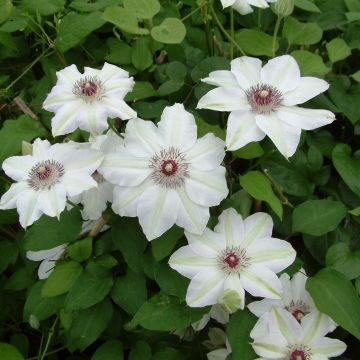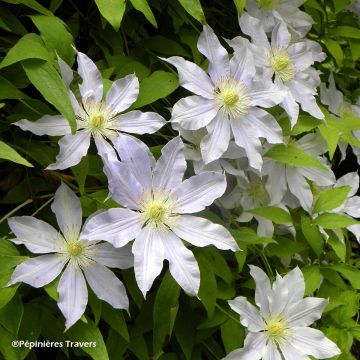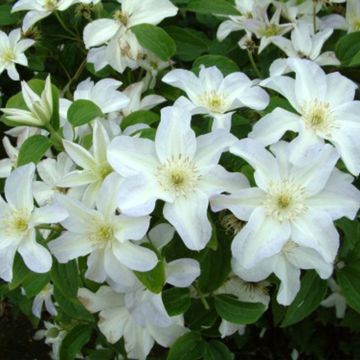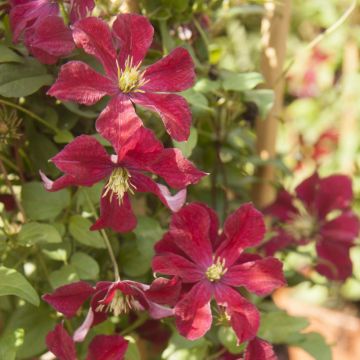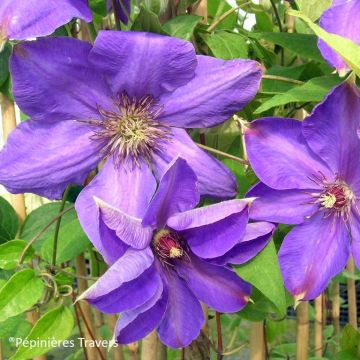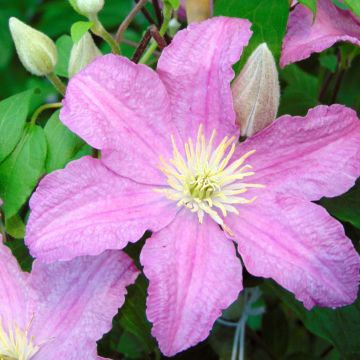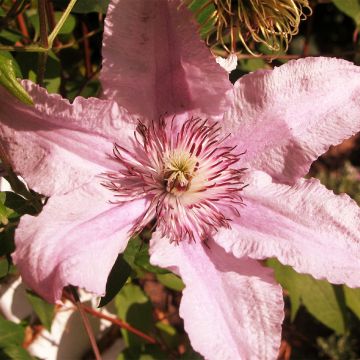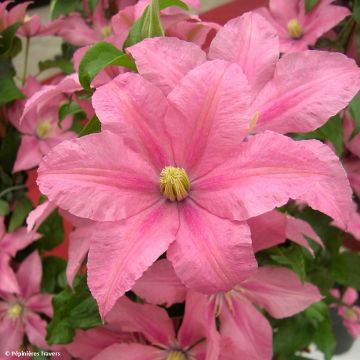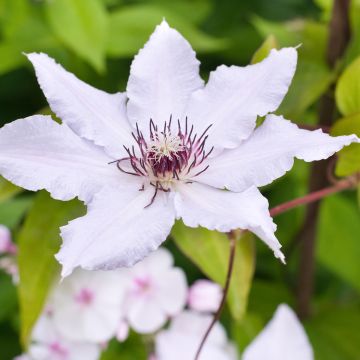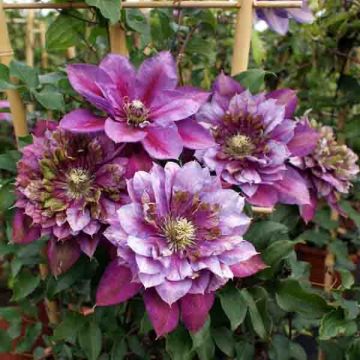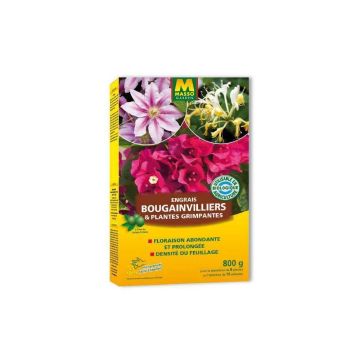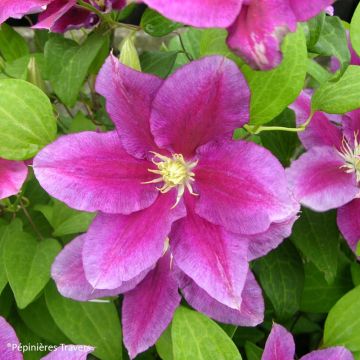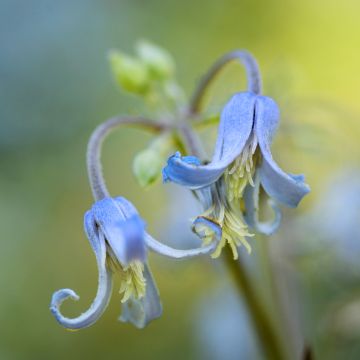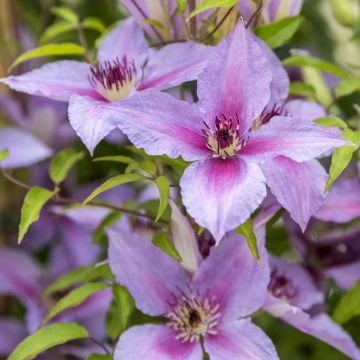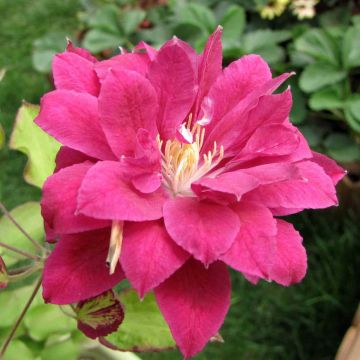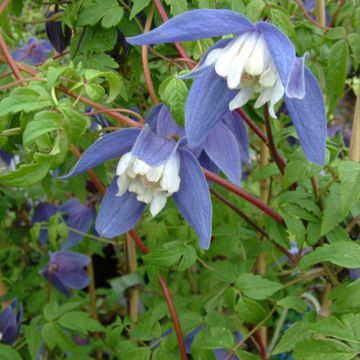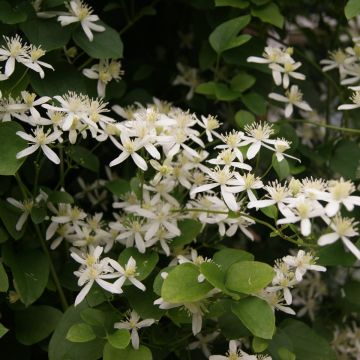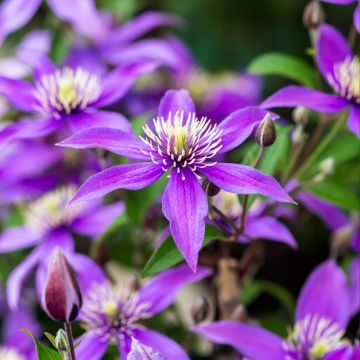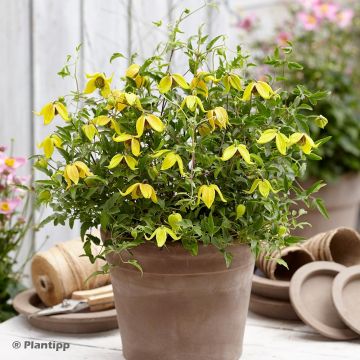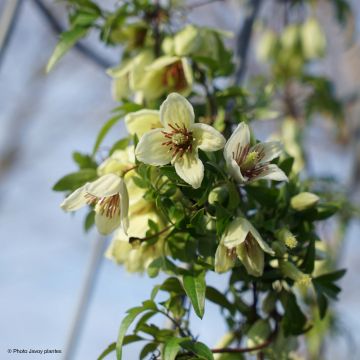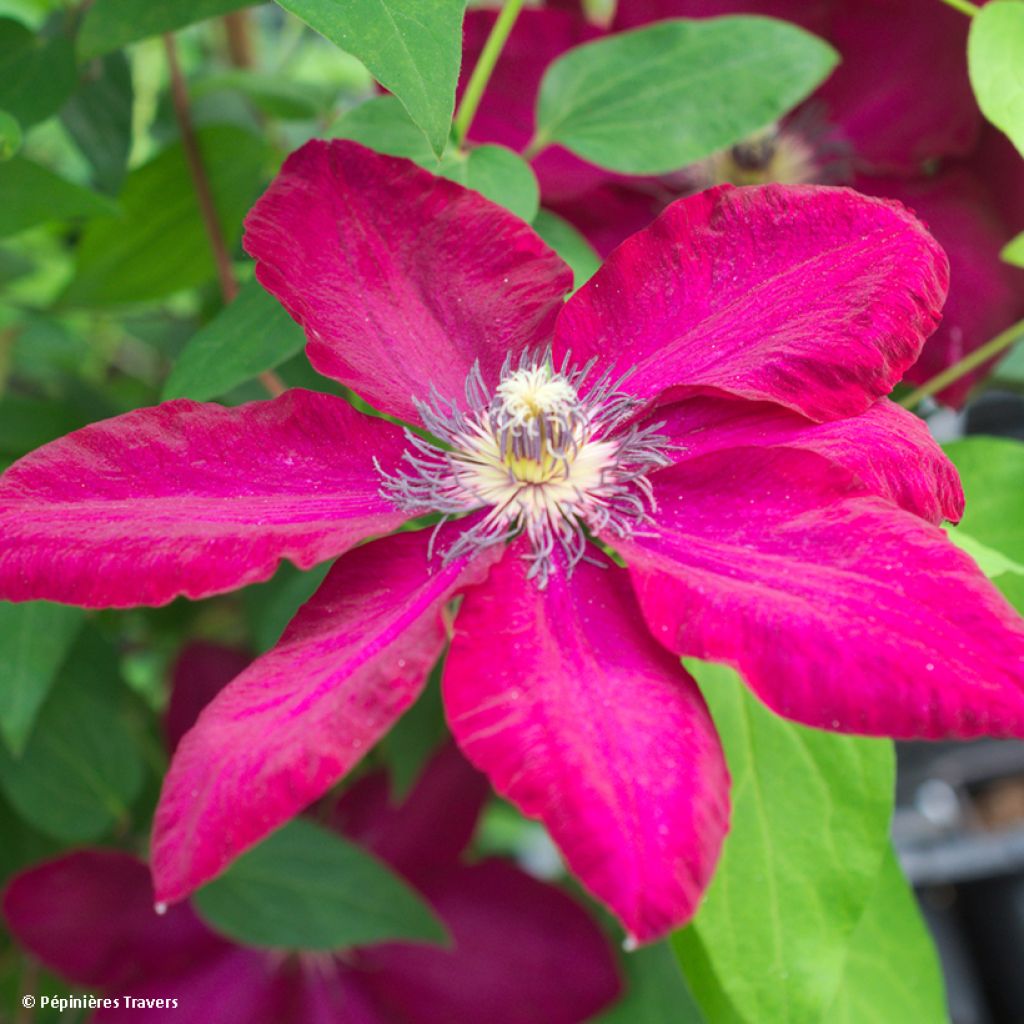

Clématite - Clematis Solidarité (Solidarnosc)
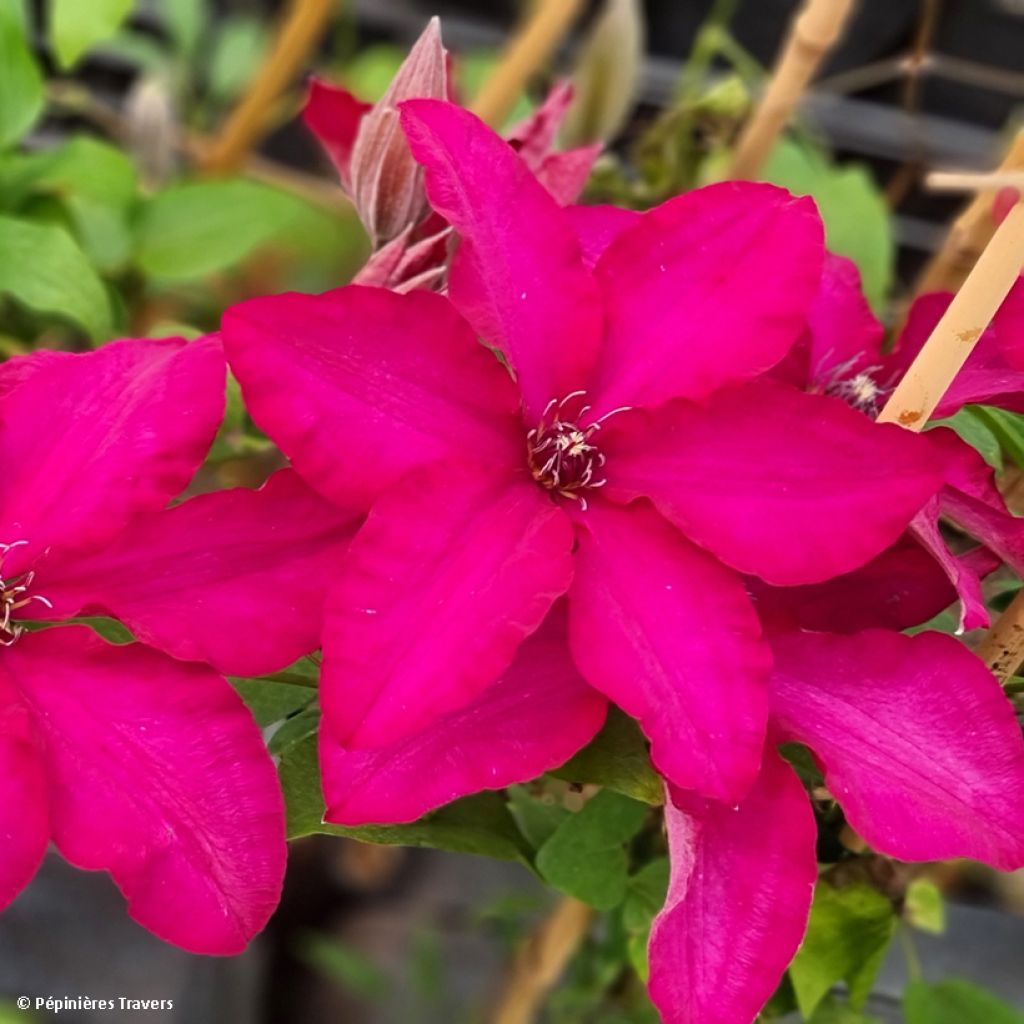

Clématite - Clematis Solidarité (Solidarnosc)
Clematis Solidarnosc
Clematis patens Solidarnosc
Early Large-flowered Clematis
This plant carries a 6 months recovery warranty
More information
We guarantee the quality of our plants for a full growing cycle, and will replace at our expense any plant that fails to recover under normal climatic and planting conditions.
Does this plant fit my garden?
Set up your Plantfit profile →
Description
Clematis 'Solidarnosc' (Solidarity) is a relatively recent Polish variety particularly appreciated for its bright flowers. It produces large star-shaped flowers in a stunning fuchsia red, all the way up its height, creating a magnificent spectacle in spring and again at the end of summer. The beautiful bright green foliage is covered in flowers for several weeks. Comfortable in the sun and also tolerant of light shade, it grows in ordinary, slightly moist soil and can cover a trellis up to 2.50m (8ft) high. It is a good variety for container cultivation, allowing you to bring colour to a terrace or balcony for much of summer.
Clematis is a member of the Ranunculaceae family, like Anemones, Trollius, Hellebores and many other ornamental genera. With about 300 species, the genus Clematis includes many climbers, as well as a few herbaceous perennials, such as Clematis stans. Clematis patens, from which 'Solidarnosc' originates, is a woody clematis native to low-altitude forests in the northern Japanese islands, described in 1836. It belongs to the group of Clematis that flower twice. The first flowering appears in spring on the previous year's shoots, then a second in late summer on the current year's shoots. This characteristic explains its success since its introduction to Europe in the second half of the 19th century, where it has been extensively hybridized to produce many horticultural varieties.
'Solidarnosc' is a relatively recent Polish horticultural variety that appeared in 2004, and was awarded a silver medal the following year at the Plantarium trade fair in the Netherlands. This relatively recent cultivar is floriferous and remarkable for the size and colour of its single flowers with 6 tepals (petals and sepals that look very similar). The well-opened corollas almost form a star but with more rounded than pointed ends, in an extremely bright red, tending towards fuchsia, with purple anther-bearing stamens, carried by white-yellow filaments in the centre. This flowering is very long-lasting in May-June, and continues throughout the summer, ensuring long weeks of flowering, with a summer break. Another asset is the exuberant floribundity of this variety, which produces flowers from its base, highlighted by beautiful tri-palmate, bright green foliage. The very large flowers can reach 16cm (6in) in diameter, this size and their warm and bright colour makes them eye-catching.
This relatively compact clematis reaches 2.50m (8ft) high and 1.50m (5ft) wide, using long-petioled leaves that wrap around any support. It is very hardy and tolerates temperatures down to -20°C, or even lower, which explains its success in Central Europe. It grows in ordinary soil, neither too dry nor too wet, but well-drained in winter. It will prefer the sun, though it tolerates some shade. You can also plant it in a pot on your terrace or near an entrance.
'Solidarnosc' is one of those varieties with moderate growth that fit in all gardens. Its dimensions are ideal for training on a trellis or dressing up a fence. Plant low-growing plants, shrubs or perennials at its base to make the most of its flowers. A carpet of Aubrieta will delight you with spring flowers before Solidarnosc takes over. Cerastium tomentosum var. columnae or Mouse Ears will accompany the large red flowers of this Clematis with its profusion of small white flowers. With Japanese Spirea Magic Carpet, it is mainly the changing foliage, bronze, orange, or yellow-green depending on the season, that will accompany Solidarnosc's vibrant flowering.
Report an error about the product description
Plant habit
Flowering
Foliage
Botanical data
Clematis
patens
Solidarnosc
Ranunculaceae
Early Large-flowered Clematis
Cultivar or hybrid
Other Clematis Patens
Planting and care
Clematis 'Solidarnosc' loves a sunny or lightly shaded location. Plant it in fertile, humus-rich, well-drained soil, shading the roots and base of the stem (with a flat tile, for example). Clematis can wilt in overly wet soil. Plant it at an angle, covering the root ball with 3 cm (1in) of soil, in a well-worked soil, lightened with good potting soil and coarse sand. After planting, prune the stems to about 30 cm (12in) from the base above a healthy pair of buds.
Water regularly during the first few weeks but be careful not to let the water stagnate as it can cause fungal disease at the collar. Mulch your Clematis in February with garden compost or well-rotted manure, avoiding direct contact with the stems. Train the stems, without crushing them, until the plant can cling for itself.
Clematis also like to grow freely on neighbouring plants. After a few years, cover the base of your climbing Clematis with a small mound of soil, this will reduce the risk of wilt while promoting the growth of vigorous new shoots from the crown. Voles and slugs can attack clematis and devour the stems. Aphids and greenhouse whiteflies are also potential pests.
Planting period
Intended location
Care
This item has not been reviewed yet - be the first to leave a review about it.
Clematis
Haven't found what you were looking for?
Hardiness is the lowest winter temperature a plant can endure without suffering serious damage or even dying. However, hardiness is affected by location (a sheltered area, such as a patio), protection (winter cover) and soil type (hardiness is improved by well-drained soil).

Photo Sharing Terms & Conditions
In order to encourage gardeners to interact and share their experiences, Promesse de fleurs offers various media enabling content to be uploaded onto its Site - in particular via the ‘Photo sharing’ module.
The User agrees to refrain from:
- Posting any content that is illegal, prejudicial, insulting, racist, inciteful to hatred, revisionist, contrary to public decency, that infringes on privacy or on the privacy rights of third parties, in particular the publicity rights of persons and goods, intellectual property rights, or the right to privacy.
- Submitting content on behalf of a third party;
- Impersonate the identity of a third party and/or publish any personal information about a third party;
In general, the User undertakes to refrain from any unethical behaviour.
All Content (in particular text, comments, files, images, photos, videos, creative works, etc.), which may be subject to property or intellectual property rights, image or other private rights, shall remain the property of the User, subject to the limited rights granted by the terms of the licence granted by Promesse de fleurs as stated below. Users are at liberty to publish or not to publish such Content on the Site, notably via the ‘Photo Sharing’ facility, and accept that this Content shall be made public and freely accessible, notably on the Internet.
Users further acknowledge, undertake to have ,and guarantee that they hold all necessary rights and permissions to publish such material on the Site, in particular with regard to the legislation in force pertaining to any privacy, property, intellectual property, image, or contractual rights, or rights of any other nature. By publishing such Content on the Site, Users acknowledge accepting full liability as publishers of the Content within the meaning of the law, and grant Promesse de fleurs, free of charge, an inclusive, worldwide licence for the said Content for the entire duration of its publication, including all reproduction, representation, up/downloading, displaying, performing, transmission, and storage rights.
Users also grant permission for their name to be linked to the Content and accept that this link may not always be made available.
By engaging in posting material, Users consent to their Content becoming automatically accessible on the Internet, in particular on other sites and/or blogs and/or web pages of the Promesse de fleurs site, including in particular social pages and the Promesse de fleurs catalogue.
Users may secure the removal of entrusted content free of charge by issuing a simple request via our contact form.
The flowering period indicated on our website applies to countries and regions located in USDA zone 8 (France, the United Kingdom, Ireland, the Netherlands, etc.)
It will vary according to where you live:
- In zones 9 to 10 (Italy, Spain, Greece, etc.), flowering will occur about 2 to 4 weeks earlier.
- In zones 6 to 7 (Germany, Poland, Slovenia, and lower mountainous regions), flowering will be delayed by 2 to 3 weeks.
- In zone 5 (Central Europe, Scandinavia), blooming will be delayed by 3 to 5 weeks.
In temperate climates, pruning of spring-flowering shrubs (forsythia, spireas, etc.) should be done just after flowering.
Pruning of summer-flowering shrubs (Indian Lilac, Perovskia, etc.) can be done in winter or spring.
In cold regions as well as with frost-sensitive plants, avoid pruning too early when severe frosts may still occur.
The planting period indicated on our website applies to countries and regions located in USDA zone 8 (France, United Kingdom, Ireland, Netherlands).
It will vary according to where you live:
- In Mediterranean zones (Marseille, Madrid, Milan, etc.), autumn and winter are the best planting periods.
- In continental zones (Strasbourg, Munich, Vienna, etc.), delay planting by 2 to 3 weeks in spring and bring it forward by 2 to 4 weeks in autumn.
- In mountainous regions (the Alps, Pyrenees, Carpathians, etc.), it is best to plant in late spring (May-June) or late summer (August-September).
The harvesting period indicated on our website applies to countries and regions in USDA zone 8 (France, England, Ireland, the Netherlands).
In colder areas (Scandinavia, Poland, Austria...) fruit and vegetable harvests are likely to be delayed by 3-4 weeks.
In warmer areas (Italy, Spain, Greece, etc.), harvesting will probably take place earlier, depending on weather conditions.
The sowing periods indicated on our website apply to countries and regions within USDA Zone 8 (France, UK, Ireland, Netherlands).
In colder areas (Scandinavia, Poland, Austria...), delay any outdoor sowing by 3-4 weeks, or sow under glass.
In warmer climes (Italy, Spain, Greece, etc.), bring outdoor sowing forward by a few weeks.

































